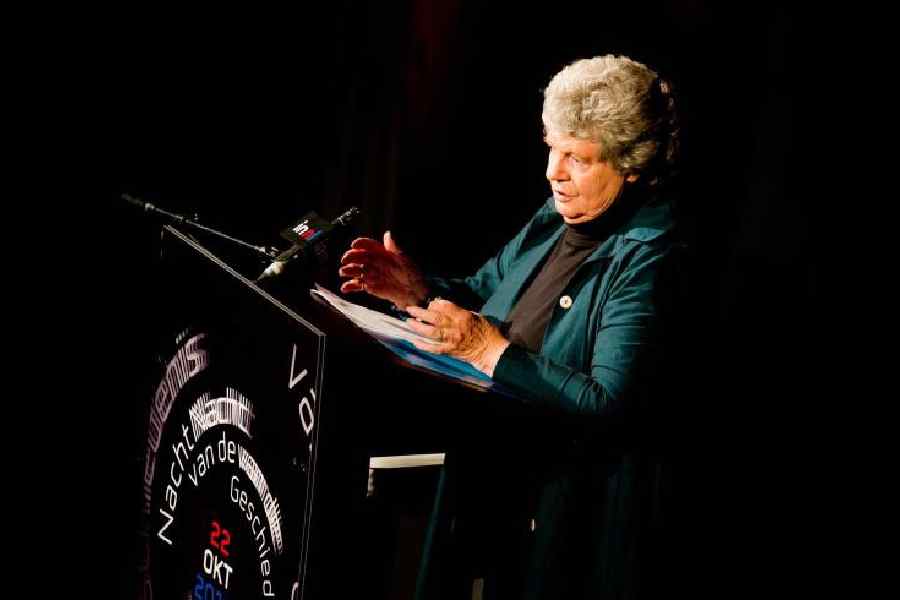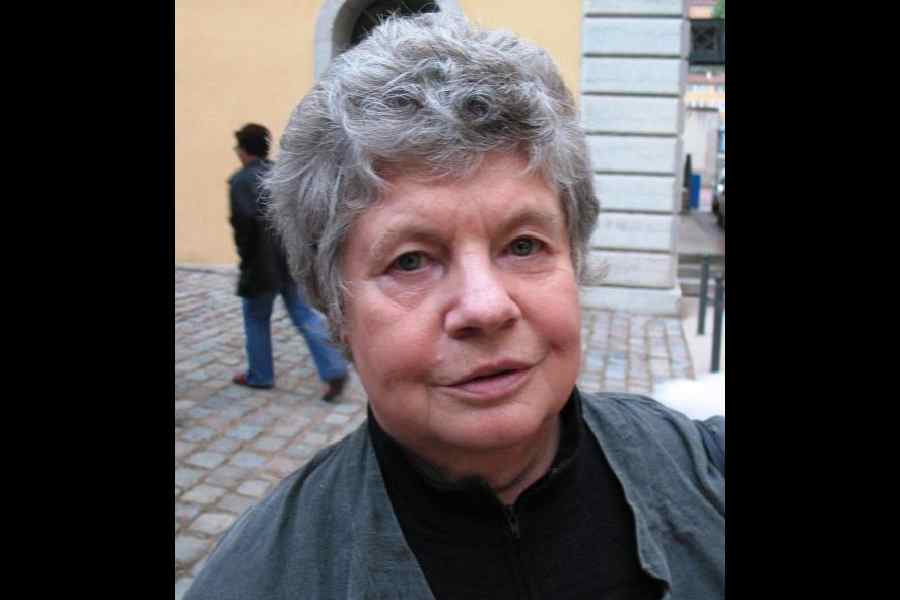Novelist, poet and professor A.S. Byatt was known to be the sharpest knife in the drawer for her critical acumen, and schmoozed with some of the greatest intellects like Frank Kermode and F.R. Leavis. A tribute
When Antonia Susan Byatt won the Booker Prize for her novel, Possession: A Romance in 1990, she remarked teasingly that she would spend the winnings on a swimming pool for her house in France. It was there, overlooking the pool, that she wrote many of her books.
An ambitious intellectual and highly respected novelist, Byatt, died on November 16 at her home, peacefully, surrounded by her family. She was 87. Applauded for her academic rigour and prolific output — 11 novels and six short story collections, and several acclaimed nonfiction books — A.S. Byatt had a steady band of admirers who grew with the splendid and complex novel Possession. For her accomplishments, she was conferred the title of Dame.
This was fiction that was erudite, that had at its core the theme of love bordering on the immoral that spanned two centuries. “I am not an academic who happens to have written a novel,” she fired, all guns blazing in an interview with The New York Times Magazine in 1991. “I am a novelist who happens to be quite good academically.”
The novelist’s intellectual rigour shows clearly in Possession.” It is often described as a very smartly conjured detective story. Romantics and historians usually find this a gripping story with the current scenario of two young scholars studying in a London library in 1985, stumbling upon undiscovered love letters written in the Victorian era.

A.S. Byatt speaking in Amsterdam in 2011 Picture by Fred Ernst.jpg
I read the much talked about book Possession 11 years after it grabbed the limelight, when I saw the film version with Gwyneth Paltrow in it taking the audience by storm. Some years later, while I was studying the great women writers of the mid-twentieth century for my PhD degree, I chanced upon a professor of the Modernist period who revealed to me the most interesting family history of A.S. Byatt. “Do you know that A.S. Byatt and Margaret Drabble are sisters who have been contestants in the literary arena for a very long time?”
I had no idea that Margaret Drabble — who wrote popular fiction and had a very large readership and used simple accessible language and had a ranconteur’s style of narration — was in fact Byatt’s younger sibling. Both came from a family interested in literary pursuits, with a mother who reviewed books occasionally and a father who was a judge.
With hugely similar academic training, both Margaret, known as Marg, and Antonia, were educated in the same sort of echelons of learning. Both studied in Cambridge and both wrote fiction. Their rivalry sometimes spilled over into the public sphere. So, I learned of Byatt’s greatest accomplishment as a fiction writer through the unveiling in real time about their rivalry as siblings who were both storytellers. I was fascinated and dug deeper into their competitive mindset. And what I found was quite intriguing. Byatt was open about this very quiet difference and competitive strain between the sisters. Owing to their sibling rivalry, they were often compared to the Bronte sisters, Charlotte and Emily, who were also competitors.
Twenty-odd years ago in Paris Review Byatt confessed in an interview: “Well, now I’m over 60, I can simply say this: the reception of my early books was completely meshed up with the fact that my sister Margaret Drabble was a writer. Nobody looked to see what I was doing, not for quite a long time. She had written more novels and she wrote them faster. I think it was extremely good for me in the long run because I had none of the things that most writers have, like the anxieties about reception. I just had this simple terror of being referred to as someone’s sister. So it was very important every time a book came out to have got the next one under way. It was very important for quite a long time not to read any of the reviews.”
Funny how we come to understand the real life behind the reel life of writers. Yesterday, I spoke to a British writer friend who knew Antonia Susan Byatt’s sister Margaret well in the 1970s and 1980s. My writer friend was quite clear that the sisters also shared a history of tragedy. A few years ago, Drabble lost her daughter Becky to breast cancer. Some of the most horror-ridden years for Byatt was the death of her son, Charles, who was just turning 11 when a drunken driver hit him on the road.
After Charles’ violent death, she wrote the following poem, gesturing towards Shakespeare’s King Lear holding his dead daughter, Cordelia, in his arms:
A Dog, a Horse, a Rat
Why should a dog, a horse, a rat have life,
And thou no breath at all?
All those red-troubled days
Heraldic in my head
Danced in their lively ways.
The bright-eyed rat, so sleek,
The dog with plume and claw
The horse’s hot bright neck
And thou wilt come no more
The terror of their life.
As Byatt said, “I took a university job in 1972 partly out of admiration for Frank Kermode [professor of English], whose department I went into, and partly because both of my husbands said I had to get a paid job to pay for my son to go to boarding school. My son Charles got killed the same week, so the whole thing became the most dreadful knot. And I taught for 11 years. Really, I didn’t want to teach. I did actually weep all night after I accepted the job.”
“Of course, in a way, after my son was dead, it was a very good thing to have the students. It was a very good thing to have the literature. And it was a very good thing to have the form of life that required you to keep moving up and down London when you would rather have sat in a heap and never moved again. Looking back on it, I treated my academic life very symbolically. I went on teaching for as long as my son had lived, and the moment I’d taught for that length of time I stopped.”
“But I never ever saw myself as an academic. I never, I think, ever saw it as anything other than a way to earn enough money to write a novel and have a bit of independence, though I do see scholarship as an extremely important and wonderful thing.”
Ordinary readers, however, found Byatt’s work to be heavily loaded with big ideas in contrast to her sister Margaret’s simplicity of style and content.
Julie Banerjee Mehta is the author of Dance of Life, and co-author of the bestselling biography Strongman: The Extraordinary Life of Hun Sen. She has a PhD in English and South Asian Studies from the University of Toronto, where she taught World Literature and Postcolonial Literature for many years. She currently lives in Calcutta and teaches Masters English at Loreto College.
